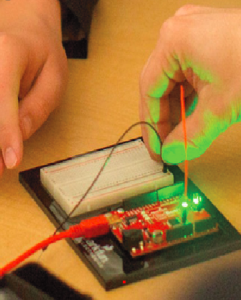Nishant Thangada ’19, Jonathan Huang ’19:
Matt Memmo, Upper School Technology Coordinator, is pushing for computer science to become a graduation requirement. Currently under discussion, the proposal would not take effect until the 2019-2020 school year.
Memmo elaborates, “There was a Computer Science Group that I was part of, and one of our proposals was to make at least half a credit mandatory for Upper School.” Explaining how it would affect current students, he continues, “The year we make it official, only the current freshman would have to fulfill the requirement, and so forth.”
A growing field that accounts for over half of the new jobs in STEM, Memmo stresses the subject’s importance. He states that the three courses offered at the Episcopal Academy – Principles of Computer Science and Engineering, AP Computer Science Principles, and AP Computer Science A – would provide foundational proficiency in “computational thinking, engineer design processing, and thought processes dealing with algorithms.”

He also explains that the courses could help develop skills outside of just “straight programming.”Elaborating on the topics of “digital literacy and digital citizenship,” Memmo says, “It’s important to know how to do simple things like making a strong password, but also how to act on social media and the repercussions involved.”
As the requirement would be only half a semester, the two APs are for those who would prefer to take a full credit rather than half a credit.
Students shared their opinions on development. Praneeth Alla ‘19, explains that “computer science isn’t solely important to those who wish to go in that respective field, but also useful to all other jobs. Many of the skills are applicable to other professions and with the world becoming heavily based on technology, it is necessary for people to be educated in computer science.” He continues, “Not only that, but many people who haven’t taken computer science are predetermined to believe they dislike it, when in reality, it could be a topic of interest once they try it.”
Schuyler Sices ‘19, says, “Initially I thought that making arts mandatory for graduating was unnecessary, but after taking classes like woodworking, I realized that it broadened my horizons. The same thing could happen to many people who dislike computer science.”